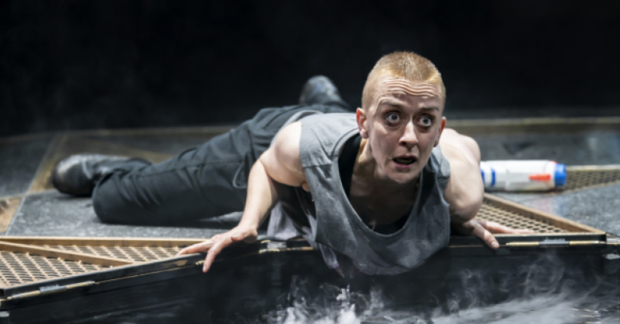Review: Macbeth (Royal Exchange, Manchester)
Lucy Ellinson stars in the new production directed by Christopher Haydon

© Johan Persson
Shakespeare's Scottish play is perhaps his most loved by audiences. Its sharply defined five-act structure details the decline of the eponymous war hero as his own ambition is fuelled by his ruthless wife. Director Christopher Haydon's new version gender-flips Macbeth into a woman, but the conceit only adds confusion rather than validating itself, as stylisation takes precedence over narrative sense.
There's an almost literal deluge of atmosphere at the opening. A deafening storm and gunshots clamour around the theatre, while at the centre of Oli Townsends's futuristic set, smoke rises out of a bubbling pool like a cauldron. This intensity quickly fades, however, when the play begins and the issues surface.
Though Bryony Davies, Nicola May-Taylor and Charlotte Merriam find collective energy as the three witches, they are characterised less as a malevolent force and more as a group of sexualised figures. In between excessive bouts of convulsions and leg thrusting, they gyrate their hips and smirk to cast innuendos out of anything as innocuous as the word "munch". They serve a much better purpose as the servants inside the castle, cleverly hinting they are infiltrating and haunting Macbeth's mind.
Inevitably, the production depends on its titular performance. Disappointingly, Lucy Ellinson coasts along, simmering away as gently as the cauldron rather than engaging as the central tragic hero. Her dark eye make-up and gaunt cheek definition convey her fear as she contemplates regicide, but they also seem to suggest weariness as Ellinson delivers the verse with a hoarse half-whisper and rising intonation. This proves detrimental to the speeches and soliloquies – a lot is lost to this muffled volume, but also to the rapid pace at which Ellinson races through, as though she is making flippant decisions rather than being confronted by agonising dilemmas.
As Lady Macbeth, Ony Uhiara is equally mixed. She captures an unhinged mania with wild wide eyes, but her shoutiness often translates as a petulance Macbeth would dismiss rather than yield to. There is, crucially, little commitment to exploring the pair's romantic relationship.
The play is a portrait of corruptive power and masculinity, and here too the gender-flipping presents an obstacle. While alterations are made to gendered pronouns in the script, it seems to deliberately retain the repeated references to masculinity. Though Ellinson visibly becomes more androgynous, as though attempting to answer the insistent question "are you a man?", the piece is far from an illuminating feminist reading.
There are more enjoyable moments, such as the manifestation of Banquo's ghost at the banquet, which lighten the otherwise punishing three hours. Above all though, the production suggests that gratuitously "reinventing" Shakespeare leads to toil and trouble.




















